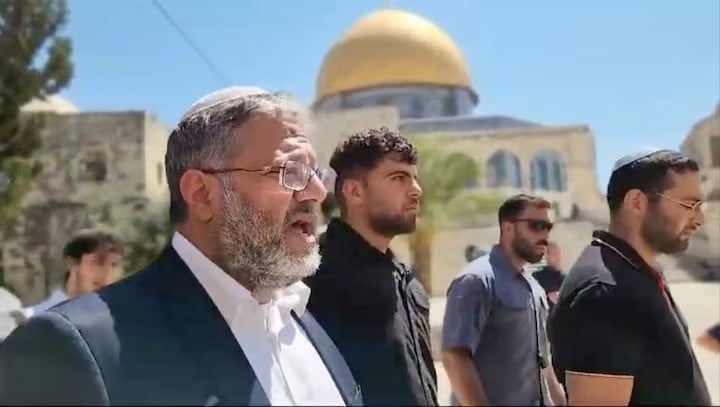Israeli Security Minister’s Call Criticized for Endangering Regional Stability Amid Sensitive Ceasefire Negotiations
JERUSALEM:
Israel’s hardline Security Minister Itamar Ben-Gvir has once again stirred controversy by advocating for Jewish prayer rights at the Al-Aqsa Mosque in Jerusalem. His remarks have drawn widespread condemnation, both domestically and internationally, for their potential to inflame tensions during a period of delicate ceasefire negotiations aimed at ending the ongoing conflict in Gaza.
In a recent interview with Army Radio, Ben-Gvir asserted, “The policy at the Temple Mount allows praying there. Period.” He further elaborated on his stance by questioning, “Muslims are allowed to pray, and a Jew is not allowed to pray?” Ben-Gvir’s provocative rhetoric extended to his response when asked if he would build a synagogue on the site if given the opportunity, to which he replied affirmatively, “Yes, yes.”
The Al-Aqsa Mosque compound, referred to as the Temple Mount by Jews, holds profound religious significance for both Muslims and Jews, making it one of the most volatile sites in the Middle East. For Muslims, the compound is the third holiest site in Islam, while for Jews, it is revered as the location of the First and Second Temples.
Ben-Gvir’s statements were met with immediate backlash from various quarters. Prime Minister Benjamin Netanyahu’s office swiftly issued a statement reaffirming Israel’s official position, which adheres to the decades-old status quo that restricts non-Muslim prayer at the mosque compound. “There is no change to the status quo on the Temple Mount,” the statement read, attempting to distance the government from Ben-Gvir’s inflammatory remarks.
The delicate status quo arrangement, which has been in place for decades, allows Jews to visit the Al-Aqsa Mosque compound but prohibits them from praying there. This arrangement is seen as crucial to maintaining a fragile peace in the region, and any suggestion of altering it has historically led to violent clashes.
Palestinian authorities and international actors were quick to denounce Ben-Gvir’s comments. Nabil Abu Rudeineh, spokesperson for Palestinian President Mahmoud Abbas, warned that such calls to alter the status of Al-Aqsa could “drag the region into a religious war that will burn everyone.” Jordan, the custodian of Muslim holy sites in Jerusalem, including Al-Aqsa Mosque, condemned Ben-Gvir’s statements as “a violation of international law and an unacceptable incitement that requires a clear international position to condemn and confront it.”
Ben-Gvir, who leads one of the two ultra-nationalist religious parties in Netanyahu’s coalition, has a history of making incendiary statements that resonate with his far-right base. However, these statements often conflict with the Israeli government’s official stance, creating tension within the coalition. Despite the criticism from his cabinet colleagues, Netanyahu’s reliance on Ben-Gvir’s party for his coalition’s survival means the minister is unlikely to face significant repercussions.

Within Israel, Ben-Gvir’s comments have sparked a heated debate. Education Minister Yoav Kisch criticized Ben-Gvir’s remarks, stating that any changes to the status quo at such a sensitive site should be handled “professionally in the cabinet along with an examination of all the meanings and consequences.” Kisch dismissed Ben-Gvir’s statements as “unnecessary and stupid populism.”
Ben-Gvir’s recent actions have also been a source of contention. Less than two weeks ago, he led a group of supporters to the Al-Aqsa compound, where many appeared to pray openly in defiance of the status quo rules. This act of defiance drew widespread condemnation and was seen as an attempt to challenge the existing arrangements at the site.
The timing of Ben-Gvir’s latest comments is particularly troubling, given the ongoing ceasefire negotiations aimed at halting the conflict in Gaza and securing the release of 109 Israeli and foreign hostages. Additionally, tensions remain high with the Iranian-backed Hezbollah movement in southern Lebanon. Ben-Gvir’s remarks have been criticized for weakening Israel’s negotiating position and jeopardizing regional stability.
Defense Minister Yoav Gallant, who has frequently clashed with Ben-Gvir, issued a scathing statement on social media, warning that “Challenging the status quo on the Temple Mount is a dangerous, unnecessary, and irresponsible act. Ben-Gvir’s actions endanger the state of Israel and its international status.”
Even within the Orthodox Jewish community, Ben-Gvir’s position has faced opposition. Some Orthodox Jews believe the Temple Mount is too sacred for Jewish entry, let alone prayer, further complicating the issue.
As ceasefire negotiations continue and regional tensions remain high, Ben-Gvir’s provocative stance on Jewish prayer at the Al-Aqsa Mosque has added another layer of complexity to an already volatile situation. The international community and Israeli government alike are left grappling with the potential consequences of these controversial remarks.


